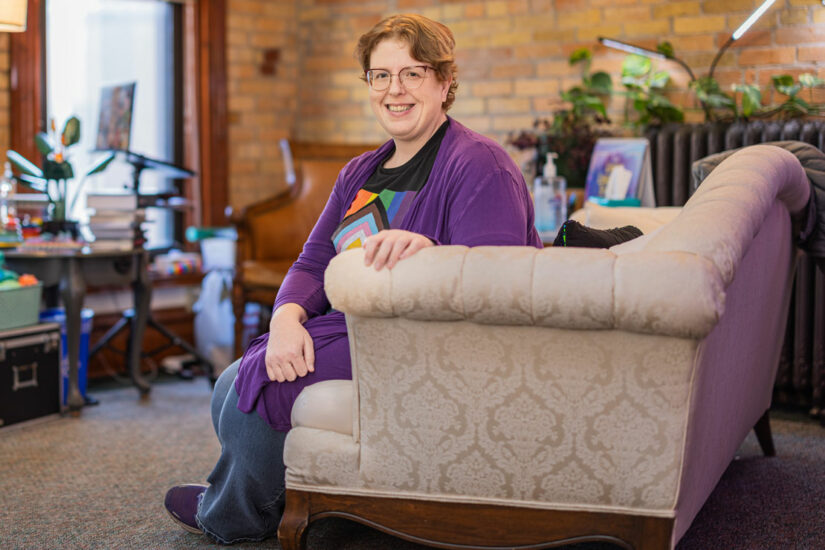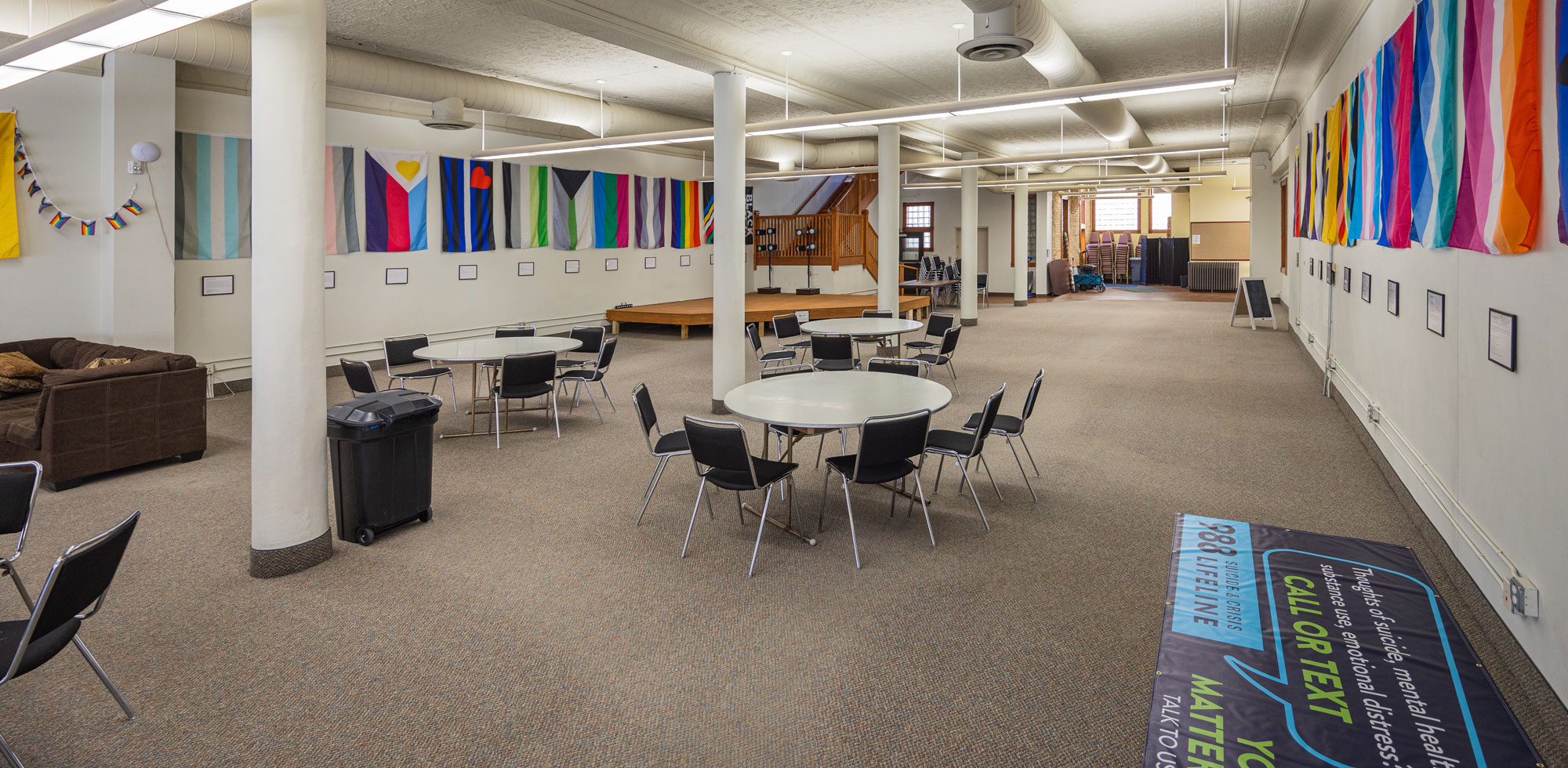
Maximum Impact
CDFI lending bridges gaps so borrowers like the Rainbow Wellness Collective can serve and thrive
By Kevin Allenspach | Photography by John Linn
Seal Dwyer can barely believe the view. Looking over downtown St. Cloud from a second-floor window on a recent sun-drenched afternoon, the sight was almost too good to be true.
Dwyer used to have a basement office up the street and around the corner, but this—the historic 1887 Lahr Block Building at 601 W. St. Germain St.—is a space Dwyer could scarcely dream about less than a year ago. Extensively renovated in 2004 when it was home to GeoComm, the building is now a monument in more ways than can fit on the small brass plaque affixed to the exterior of the building certifying its place on the National Register of Historic Places.
In addition to Seal Dwyer Counseling, a licensed marriage and family therapy practice that focuses on people who identify as queer or who are dealing with trauma, other offices in the building include EveryBODY Wellness, OutFront Minnesota, Queerspace Collective, and St. Cloud Pride. They’re all tenants along with the Rainbow Wellness Collective, the only LGBTQIA2S+ (lesbian, gay, bisexual, transgender, queer, intersex, asexual and two-spirit) community center in the state.
Dwyer believes the transition to this anchor location in downtown St. Cloud was a fortunate convergence of the right people being in the right place at the right time. That includes a think-big real estate agent, a generous and willing seller, and a loan package supported by MinnWest Bank and the Initiative Foundation, one of the region’s only Community Development Financial Institution (CDFI) certified by the U.S. Department of Treasury.
CDFI in Action
The Initiative Foundation is one of nearly three dozen Minnesota CDFIs and one of just two serving Central Minnesota. (Leech Lake Financial Services also is a CDFI.) It’s a designation the Foundation has proudly held since 1997. The organization re-upped its commitment in 2023 when it created the Impact Fund, a subsidiary organization that will be home to the Foundation’s lending and support services programs. By providing access to capital and serving as a resource magnet to support borrowers who may face barriers, CDFIs like the Initiative Foundation help to create opportunities for economic growth and empowerment in disadvantaged areas.
“Through the Impact Fund and our status as a CDFI, we can be more aggressive than a traditional lender,” said Doug Adams, Impact Fund finance manager for the Initiative Foundation. “It means we can support emerging businesses more fully with the additional backing we receive from the U.S. Department of Treasury. We don’t try to take on the business of traditional banks but, rather, we complement their efforts. Our goal is to support businesses that need help to grow and gain a stable position so they can graduate to traditional lending sources.”
CDFIs support underserved entrepreneurs and community-focused economic development in several ways:
- Access to Capital: CDFIs provide access to affordable credit and financial services for individuals, small businesses, and organizations in underserved communities. They offer loans, microloans, and other financial products that may not be available through traditional banks or lenders.
- Flexible Lending: CDFIs have more flexible lending criteria than traditional financial institutions, allowing them to serve borrowers who may not qualify for conventional loans due to factors such as low income, lack of credit history, or past financial challenges.
- Technical Assistance and Financial Education: Many CDFIs, the Initiative Foundation included, offer technical assistance to increase the success rate of small businesses and entrepreneurs. Training and financial education programs help borrowers build their financial literacy, improve their creditworthiness, and develop business management skills.
- Targeted Investment: CDFIs target their investments in projects and businesses that have the potential to generate positive social and economic impacts in underserved communities.
- Community Development Initiatives: CDFIs often collaborate with local community organizations, government agencies, and other stakeholders to support broader community development initiatives. This may involve participating in workforce development programs, or investing in projects that address specific community needs.
“Our goal is to deploy more lending capital in low-income areas and in diverse communities across Central Minnesota,” Adams said. “We’re also reaching out to the wider economic development community to say, ‘Hey, how can we help new businesses get started in your communities?’ The outreach effort is augmented by our entrepreneurship programs that offer a spectrum of support to emerging business owners.
“The people we want to help are still working to get banks to see them as viable customers. Some don’t have a whole lot of credit history or a lot of collateral to go on. But they can provide services to large numbers of people who need them,” Adams said. “In some cases, there are language barriers. We offer technical assistance—training, business planning—and we educate our clients about what banks are looking for so they will eventually become bankable customers. Our goal is for them to eventually move into the traditional lending system so we can keep turning our dollars to help new people.”

A Win-Win Outcome
Dwyer and members of the Rainbow Wellness Collective toured buildings all over downtown St. Cloud, never bothering to consider the Lahr, which had an original price tag of $1.7 million. Commercial real estate agent Eric O’Brien convinced them to look. And Devin Larson, vice president and senior commercial banker at Minnwest Bank, who serves on the Initiative Foundation’s Business Finance Committee, also wanted to help. He brought the project to the Initiative Foundation, and through a combination of lending and generosity by the sellers, Tom and Janet Grones, the Lahr Block Building located in a CDFI investment zone went from out-of-bounds to home.
“They knocked a million dollars off the price,” Dwyer said, “so we got into this beautiful, huge, old building for $650,000.”
Tom and Janet Grones are thrilled to know the building, and their careful renovation efforts, will be put to continued good use. The couple sold their interest in GeoComm a decade ago to Granite Partners, a private investment and holding company—and crucial Initiative Foundation partner—based in St. Cloud. They retained ownership of the building and continued to lease it back to GeoComm until COVID-19 ushered in fully remote work.
When the lease expired in May 2023, the couple listed the property only to realize that office buildings had lost value during the pandemic. “It was self-serving to some extent, but both my wife and I had invested a great deal of money in those restorations and, after we met with Seal and some of her staff, we were pleased it was going to go to someone who could appreciate its history and function. We were interested in anything that was going to bring folks downtown, and we were interested in seeing a nonprofit move in.”
One of the Collective’s first big events was Queer Year’s Eve on Dec. 31. A few days prior, two people from St. Cloud Pride built a stage and Anthony Schrock from GREAT Theatre scavenged some lighting. Dwyer said it’s just another example of how everything has fallen into place. And while the Collective intends to serve people within a 50-mile radius, response is coming from further away, too.
“Everyone associated with this did so much and I’m so in awe of having stewardship of this building,” Dwyer said. “It’s utterly perfect for our use, and there’s no better place downtown. We’re half a block from a parking ramp. We’ve got a huge open sidewalk across the street. We have a big enough community to support this place. But we’re a small enough community that we can fit in this space. The Twin Cities can’t pull this off.”
The Collective will seek additional tenants as of Jan. 1, 2025, and Tom and Janet Grones are happy to see what the Lahr Block Building has become.
“All people deserve a space where they can go and be themselves,” Tom Grones said. “The businesses are working together to serve a need in our community. My wife and I believe everyone has a right to try and make their life better, and that’s what we see happening there.”
To Dwyer, the prominent downtown presence represents visibility and safety.
“As a therapist, I’ve watched people have PTSD symptoms from the laws that have been getting passed in states that aren’t Minnesota, which is one of a few beacon-of-hope states for queer folks,” she said. “People smash on St. Cloud all the time, but I love this town. I grew up here. And I want to make it the best I can.”
Learn more about the Initiative Foundation’s lending program.